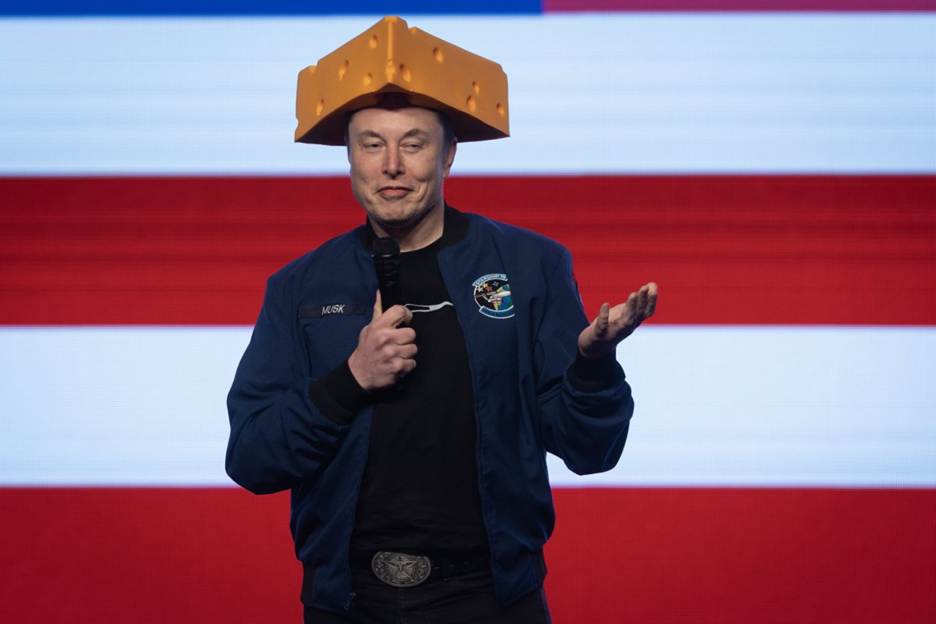
Billionaire businessman Elon Musk arrives for a town hall wearing a cheesehead hat at the KI Convention Center on March 30, 2025, in Green Bay, Wisconsin. Scott Olson/Getty Images
Elon Musk’s heavy involvement in the Wisconsin Supreme Court election pushed more voters away from the Republican candidate than it persuaded to support him, according to a poll.
A survey from the Democratic polling firm Blueprint, shared with The Washington Post, found that 30 percent of voters said Musk’s multimillion-dollar intervention made them less likely to support Brad Schimel over liberal candidate Susan Crawford, compared to 5 percent who said it made them more likely.
The Blueprint poll surveyed 747 registered Wisconsin voters who participated in the state’s Supreme Court election. It was conducted April 2-3 and had a margin of error of plus or minus 4.1 percentage points.
Newsweek has contacted Musk via the offices of X, formerly Twitter, which he owns, for comment via email.
Why It Matters
The results of the April 1 Wisconsin Supreme Court election, won by Crawford by 10 points, were seen as a setback for both Musk, the world’s richest person, and President Donald Trump, suggesting potential challenges for their political influence in future contests.
What To Know
The Wisconsin race was the most expensive judicial election in U.S. history, with spending exceeding $100 million.
Musk and his affiliated groups played a prominent role, contributing more than $20 million in support of Schimel’s campaign.
His involvement also included offering financial incentives to voters who signed petitions opposing “activist judges.” Wisconsin Attorney General Josh Kaul, a Democrat, filed a lawsuit to stop the initiative, arguing it amounted to offering gifts for votes, but the state’s Supreme Court declined to hear the challenge.
The Blueprint poll showed most Wisconsin voters disapproved of Musk’s heavy involvement in the race—and that his intervention may have backfired.
According to the poll, 30 percent of voters said they were less likely to support Schimel because of Musk’s endorsement, while 5 percent said it made them more likely.
The gap widened among the key independent demographic, with 33 percent saying Musk’s support made them less likely to back Schimel, while just 4 percent said it made them more likely.
Musk’s opposition to Crawford may have galvanized her support: 29 percent of all voters and 29 percent of independents said it made them more likely to vote for her. Even among Republican voters, Musk’s influence was limited, with 83 percent saying his endorsement had no effect on their vote. Just 5 percent of Schimel voters said they did so because it was important for Musk. Nearly half (45 percent) of Republicans said they disapproved of Musk’s petition-signing initiative, which involved handing out two checks for $1 million to Wisconsin voters. Overall, 69 percent of all voters disapproved of it.
In total, 70 percent of Wisconsin voters said they disapproved of Musk’s involvement in the race, compared to 30 percent who approved.
What People Are Saying
Democratic pollster Evan Roth Smith, analyzing the poll for The Washington Post: “The verdict from the race appears clear: The closer Musk is to an election’s central narrative, the worse Republicans do. And while the president might seek to distance himself from Musk in the coming weeks and months, the impression that Musk is currently a central figure of the Republican Party seems indelible. Democrats are already trying to goad him into a larger public-facing role for a reason.”
Casey Burgat, a former congressional staffer, now a professor of legislative affairs at George Washington University, previously told Newsweek: “Elon Musk’s high-profile involvement in the early days of Trump 2.0 likely sparked voter backlash, especially among independents and swing voters. While it has undoubtedly energized parts of the Republican base, it raised deep concerns about executive overreach, blurred lines between public funds and private interests, and a disregard for congressional oversight, fueling Democratic turnout and swing district resistance.”
Elon Musk, on X on April 2: “I expected to lose, but there is value to losing a piece for a positional gain.”
What Happens Next
Crawford’s election victory preserves the Wisconsin Supreme Court’s 4-3 liberal majority, which will shape decisions on key state issues, including abortion rights and legislative redistricting. (Newsweek)